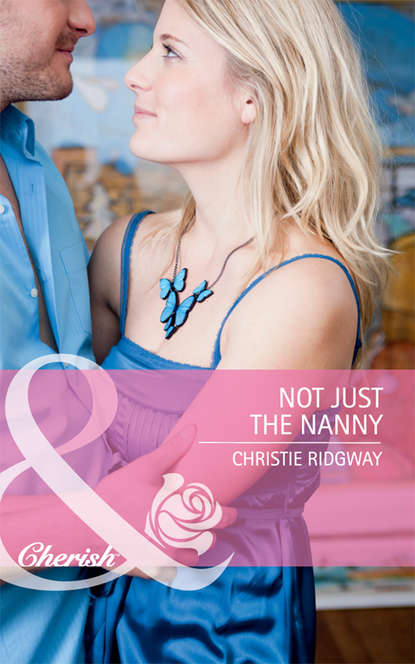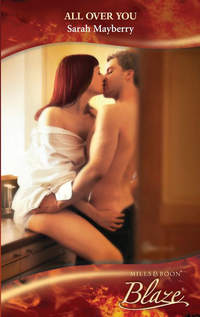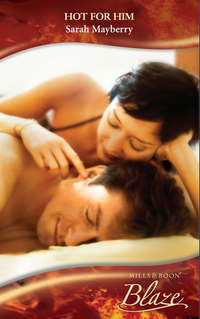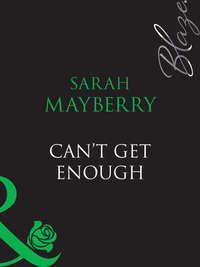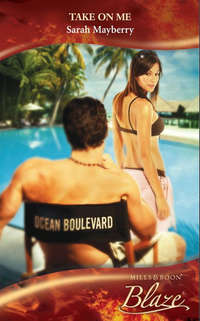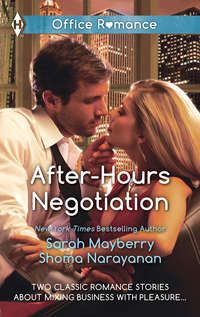
Полная версия
Her Best Friend
He’d been so proud of this place when they’d signed the papers two years ago. A little scared, too, of the debt they’d been taking on. But Lisa had sold him on the risk, convinced him that they needed to live in the right suburb, drive the right kind of cars, have the right people over for dinner. She’d always been ambitious. Keen to kick the dust of small-town Australia off her heels. It was one of the things he’d always admired about her.
He hadn’t realized that she’d outgrow him one day, too.
He walked up the path to the front door and slid his key into the lock. He braced himself, then pushed the door open. And there it was—a wash of jasmine and spice. Lisa’s perfume, even though she’d been gone for nearly a year. He caught an echo of it every time he came home. Something he could definitely live without.
He walked to the kitchen, dumping his dinner on the counter before crossing to the rear of the house and flinging the French doors wide open. The house needed airing out, that was the problem.
He upended his curry into a bowl and grabbed a fork from the drawer. Once the divorce was finalized, this place would go on the market and he wouldn’t have to worry about her perfume anymore. Then he could move to an apartment, maybe some place in the city. A bachelor pad, full of high-tech gadgets and the kind of non-fussy furniture he preferred.
Quinn stared down at the messy curry in his bowl. This was not how he’d imagined his life would look at thirty. Not by a long shot.
He took his dinner to the study and immersed himself in the work he was doing for Amy. Another hour of research and digging and he had the information he needed to help her with her cause. He picked up the phone, then put it down again without dialing.
There was something he needed to get straight with himself before he spoke to her again. He’d lied to her earlier when she’d asked if Lisa was there, leading her to believe that Lisa was out for the evening rather than long gone. Which went far beyond simply not telling her the marriage was over.
Why hadn’t he told her, the way he’d told his parents and his colleagues at work and his and Lisa’s mutual friends here in Sydney?
He rubbed the bridge of his nose. Leaned back in his chair.
The truth was, he hadn’t wanted his oldest friend to know that his marriage was a failure. Which was a great gauge for where his head was at the moment, wasn’t it?
Maybe he really did need this holiday.
He hadn’t been lying when he told Amy that he’d been thinking about her, though. He’d been thinking about her a lot. About the conversations they used to have lying in the tall grass at the bottom of her parents’ yard. About the way she always used to call him on his bullshit. About the times all three of them, he and Amy and Lisa, had gone swimming in the lake after dark.
All of it a far cry from the polished, finely honed world he occupied now. The corner office. The partnership in the prestigious law firm. The expensive European car. The soon-to-be expensive divorce.
Quinn shook his head. He really needed to get his head out of his own ass. Too much time on his own these days and he started thinking things to death. This was why he worked late. And why he was reluctant to spend two weeks on an island somewhere pretending to read a spy novel.
He palmed the phone and dialed Amy’s cell. She answered after one ring and he knew she’d probably been hovering by the damned thing, hoping he’d call back, even though he’d said it wouldn’t be until morning.
“Quinn,” she said. She sounded breathless. Scared.
“Good news. I’ve done some digging, and the Grand is listed on the town’s heritage register for both its interior and exterior architectural features. Which means that any development has to preserve the interior as well as the facade.”
“Oh my God. Thank you. Oh, Quinn. Thank you.” Her voice was thick with emotion.
“Don’t get too excited yet. Ulrich’s proposal shouldn’t have ever made it past first base. But it did, which means council are prepared to flout their own bylaws if given enough incentive.”
There was a long silence from the other end of the phone.
“But once I point out that they can’t do that, they’ll have to reject the offer, right?” Amy said.
“Not if they think they can get away with it. If the money’s big enough, people will do just about anything, Amy. I’ve been doing some checking, and Ulrich Construction has the contract to build the extension on the school gym, the new wing on the library and the new medical center over near the day spa. I’d say Barry Ulrich and the council are very nicely tucked up in bed with each other, wouldn’t you?”
“Oh.” She sounded nonplussed, and despite the seriousness of the situation, he had to smile. Amy had always been too busy thinking the best of people to see the worst.
“The council was probably hoping that they could slip this under the radar while nobody was looking.”
“Well, that’s not going to happen,” she said. “Not while I’m still living and breathing.”
“I didn’t think so.”
“So, what do I do? Go to the meeting, let them know that I know what they’re up to?” He could hear her taking notes.
“For starters. Take people with you, make sure there are plenty of witnesses to keep the councillors on their toes.”
“Dad can get his cronies from the Chamber of Commerce to come along. They can throw a bit of weight around when they want to. And Denise knows a guy at the local paper.”
“Perfect. I’ll draft up a statement for you to read. Something with enough legalese in it to give them pause.”
“Good. Pause is just what I want to give them. And then some.”
“I’m heading off on holiday tomorrow, but I’ll get the statement to you by morning, okay? And you can reach me on my cell if you need me.”
“Oh. Okay.” There was a short silence. “Where are you guys going?”
Now was the time to correct her, tell her that he was going on holiday alone. That Lisa had left him.
“Hamilton Island. Couple of weeks of sun and surf.”
“Sounds good.”
He drew a meaningless squiggle on the page in front of him. “Yeah.”
She took a deep breath on the other end of the line. “You’ve been great, Quinn. I want you to know I really appreciate your help with this.”
“It’s no big deal, Ames.”
“It is to me. It’s a huge deal.”
“Well.” He made another squiggle, then obliterated it in a flurry of pen strokes. “Don’t be a stranger, okay? Drop me a line now and then. And let me know how things go on Friday, okay?”
“I will.”
Neither of them said anything for a long moment. He could hear her breathing and he could feel the truth pushing its way up his throat.
It’s all screwed, Ames. My marriage, my life. I have no idea what I’m doing anymore.
“Good luck,” he said. Then he put the phone down before the truth could escape.
She didn’t want to hear his sad story. She was fighting for her dream. And they weren’t friends the way they used to be. He’d done something wrong, or something had gone wrong and he’d been too busy with his own crap to notice.
Same difference.
He flicked off the lights and walked through his empty house.
OVER THE NEXT THREE DAYS, Amy cajoled, begged, bribed and harassed her friends and neighbors until they agreed to join her at the council meeting on Friday evening. She phoned the local newspaper no less than seven times chasing Denise’s friend and finally cornered him in the butcher’s at lunchtime on Thursday.
One of the advantages of living in a small community—you could run, but not for long, and you sure as hell couldn’t hide. She promised him a good show and he promised her a reporter. She left in high spirits.
Quinn had been as good as his word and e-mailed her a precisely written statement to read during the meeting. It cited precedents and bylaws and subsections and clauses. She couldn’t follow most of it, but she figured that probably meant that the majority of the councillors wouldn’t be able to, either, which was good. She wanted them to be intimidated. She wanted them to know they were going to have a fight on their hands if they tried to push this thing through.
Her great-grandfather had built the Grand in 1929. He’d commissioned an architect in Sydney and imported marble from Carrara and light fittings from Venice. He’d created a wonderful legacy for the community. No way was Amy going to roll over while some greedy developer turned it to dust and replaced it with a bunch of shoe-box-size apartments.
She dressed carefully for the big meeting. A borrowed suit from Denise, neat and black and businesslike. A pair of new shoes that hurt her toes but gave her an extra four inches in height—very necessary since she was only five feet tall and often mistaken for a kid. She pulled her shoulder-length curly blond hair into a bun and painted her face with more makeup than she usually wore. She didn’t want anyone mistaking her for a kid tonight.
It was only a short drive to the council chambers. Amy’s new shoes pinched her feet as she walked across the gravel parking lot toward the front entrance. By the end of the evening she doubted she’d be able to feel her pinky toes, but if she won the Grand, she figured it would be well worth the sacrifice of two small digits.
She saw her family and friends the moment she walked into the meeting room. The public gallery was full of familiar faces—her parents, the Joneses, Denise,
Maria, Katherine. Cheryl and Eric from work, a few of the customers from her parents’ store.
A better turnout than she’d hoped for. Which was good, right?
She made her way to the front row where tables were provided for members of the public who wanted to make notes or present evidence. She put down her bag and took a deep breath. So far, so good.
Then she looked up and saw Barry Ulrich standing with his lawyer, a young guy in a slick suit. They were talking to Reg Hanover and a couple of the other councillors, and everyone was smiling and nodding as though they were in complete and utter agreement with each other.
Amy could feel the blood drain out of her face.
Barry had brought his lawyer. And all she had was a statement from Quinn and her own very inexpert understanding of the council bylaws. She pressed a hand to her stomach. If she messed this up, it was over. The Grand would be smashed to pieces. There was no coming back from that.
Barry glanced over and caught her eye. His smile broadened and he gave her a friendly little wave. As though this was a cocktail party, and he the host.
Goddamn.
She should have hired a lawyer. She’d resisted because of the expense, but it was stupid to economize when failing at this hurdle meant the end of the game. What had she been thinking with her puny little statement and her cheering squad?
“Sorry I’m late,” a deep, familiar voice said from behind her. “My flight was delayed, and there was construction on the freeway.”
A shiny black leather briefcase landed on the table.
Amy turned and blinked at the tall, dark-haired, dark-eyed man standing beside her. “Quinn,” she said. “You came.”
CHAPTER TWO
“LIKE I SAID, I would have been here sooner but shit happened.”
It had been a close-run thing, but he’d made it. And in the nick of time.
Quinn pulled a file and a legal pad from his briefcase then clicked it shut again. Only when he was satisfied that he was ready to roll did he look Amy fully in the face.
Her blond curls had been tamed into a conservative bun, and her face was less full and her cheekbones more prominent than when he’d last seen her. His gaze got caught for a moment on her lower lip, full and shiny with gloss, then slid lower to take in her neat little suit and towering high heels.
He frowned.
“You look different.” He wasn’t sure if he liked it. Whenever he pictured Amy in his mind’s eye, her hair was always wild and her clothes mismatched. Most importantly, she was always laughing. The woman standing in front of him looked as though she’d had all the laughter drained out of her.
“Do I?”
“Yeah. Since when did you start wearing suits?”
“Since I borrowed this from Denise.” She shook her head. “I can’t believe you’re really here.”
“I did a bit of checking into Ulrich,” he said. “Guy’s got some serious connections around town. Figured you might need someone to ride shotgun.”
Her gaze searched his face just as his had searched hers. He wondered if he looked as tired as he felt, if she could see past the mask he’d worn for months now.
Before either of them could say any more, a middle-aged man wearing the ugliest tie he’d ever seen banged a wooden gavel on the long table placed before the council members.
“This council meeting is now in session. I call upon the secretary, Councillor McMahon, to read over the minutes from the previous meeting.”
A gray-haired woman with a severely short haircut began to drone her way through the minutes. Quinn turned to Amy but she spoke before he could get the question out of his mouth.
“Reg Hanover,” she said. “He’s the chairman, and Dulcie McMahon is the one speaking.”
Quinn drew a quick representation of the council table on his notepad and labeled the central position and the secretary. Amy reached across and slid his pen from his hand, an old trick of hers from high school. She angled his notepad toward herself and started jotting names in the other six seats along the table, indicating official roles where applicable. He glanced at her profile as she wrote. She might have swapped her usual bright, haphazard fashion for a suit and high heels, but she still poked the tip of her tongue between her lips when she was concentrating.
He suppressed a smile.
She glanced up at him and quirked an eyebrow. What?
He shrugged. Nothing.
She pushed his notepad toward him.
“What happened to Hamilton Island?” she asked quietly, one eye on the councillors.
“It’ll keep. I wanted to make sure you were over the line first.”
A flurry of yays drew his attention to the front of the room as the councillors voted to accept the minutes as a true record of the last meeting.
Quinn could feel someone watching him and he glanced to his left to find a man in his midfifties scowling at him. Ulrich, if Quinn didn’t miss his guess. The older man had the flushed complexion of a heavy drinker and his pale blond hair was brushed carefully to try to disguise the fact that it was thinning.
Quinn held the man’s gaze for a few long seconds. Ulrich’s scowl deepened, then he looked away.
It was enough to tell Quinn that the guy was a hothead. Which meant this meeting had the potential to get interesting. Quinn smiled slightly as he returned his attention to the front of the room. He’d never been afraid of a fight.
Amy sat straighter as the chairman cleared his throat.
“First up on the agenda is the sale of the Grand Picture Theatre to Ulrich Construction. All councillors have received copies of a proposal from Ulrich Construction to redevelop the property into an apartment building offering luxury accommodation for tourists visiting the area,” the chairman said.
He shuffled the papers in front of him then glanced quickly around the room—avoiding looking directly at Amy, Quinn noted. Guilty little rat.
Reg went on to read from the most flowery sections of Ulrich’s proposal, effectively selling the project on the other man’s behalf. Not hard to work out which side Hanover thought his bread was buttered on.
Amy’s hands tightened on her pen until her knuckles were white. He leaned closer to her ear. “We’re not leaving until the Grand is safe. I promise.”
He could smell her perfume, something sweet and light. One of her curls had escaped her bun to brush her cheek. She nodded her understanding but retained her death grip on the pen. He understood her fear. He doubted she’d be able to relax until after this meeting was over.
“Council has reviewed the proposal and considers it to be of benefit to the greater community of Daylesford,” the chairman said. “However, in accordance with policy, we now invite any members of the public who may wish to comment to take the floor.”
His words were still echoing around the chamber as Amy stood, her chair scraping across the floor.
“I have a few questions for council,” she said. There was a nervous quaver in her voice, but her chin was high and her shoulders square. “I’d like to know what measures the council has in place to ensure that Ulrich Construction’s development will preserve the unique architectural features of the Grand Picture Theatre. Features which are detailed in the town’s own historical register.”
“I’m not conversant with the exact wording of the register, Amy, but what you must understand is—”
“I have copies,” Amy said, holding up a handful of photocopies.
A woman with garnet-red hair popped up from her seat in the front of the public gallery. She winked at Quinn as she crossed the room and took the copies from Amy. It took him a moment to realize it was Denise Jenkins. She’d had mousy brown hair when he’d last seen her.
“Thanks, ‘Nise,” Amy whispered.
“Kick ass, sweetie,” Denise whispered back. Then she turned to distribute the copies to the council members.
“I have a copy for you, too, Mr. Ulrich, in case you aren’t aware that both the interior and exterior of the theatre are listed for protection,” Amy said.
She held a sheet out, but both Ulrich and his lawyer ignored her. Surprise, surprise. The last thing they wanted was to hear about the architectural features they planned to turn to rubble at the earliest opportunity.
Amy shrugged, then launched into her argument. She was passionate and articulate, her small body vibrating with determination. Quinn alternated between making notes and watching her face. Despite the circumstances, despite the distance that had grown between them, it was good to see her. To look into her familiar brown eyes and hear her voice.
Opening salvo fired, Amy sat. She glanced at him and he smiled. She offered him a nervous grimace in return.
Ulrich’s lawyer stood next, launching into a soliloquy on the “extraordinary and prohibitively expensive” accommodations Ulrich had built into his plans to preserve the theatre’s historic facade, painting the other man as a community benefactor sacrificing personal wealth for the good of all.
“What a load of bullshit,” Amy muttered under her breath.
“Come on, the guy’s clearly a saint,” Quinn murmured. “One step away from being recognized by the Pope.”
“Thank you, Mr. Collins,” Reg said when the lawyer was done. “I think we’ve all heard enough to make an informed decision. Ladies and gentlemen, I believe we’re ready to vote.”
Quinn almost laughed at the clumsiness of the other man’s tactics. They’d barely opened discussion, yet the chairman was trying to ram the vote through. Quinn was suddenly very, very glad that he’d decided to ditch his vacation.
An angry murmur went up from the gallery. Amy started to stand again, but he caught her arm.
“My turn, I think,” he said quietly.
He rose. “Before you start tallying votes, Chairman Hanover, I’d like to draw the council’s attention to a number of recent findings in the Victorian Supreme Court. It might be helpful for council to understand what penalties have been applied to cases where historically listed sites have been exploited by unscrupulous developers.”
That brought Ulrich’s lawyer to his feet.
“I object to the inference that my client is unscrupulous,” the younger man said.
“Go right ahead. But you might want to remember that we’re not in a court of law so there’s no one to actually uphold your objection,” Quinn said. “But please, feel free if it increases your billable hours.”
Ulrich’s lawyer turned a dull brick-red. Quinn refocused on the council members. Eight men and women, all of them looking decidedly uncomfortable. They were about to get more so.
“I’d also like to remind councillors that when they were elected to office they took an oath which binds them to a code of conduct which requires them to uphold all the bylaws of the county, not simply those which are deemed convenient at the time.”
Several of the councillors shifted in their seats. Quinn undid the button on his jacket and slid his hands into his trouser pockets. He had the floor, and he wasn’t giving it up until he had these bastards on the run.
“Where was I? Right, the State of Victoria versus Simpkin-Gist Construction …”
TWO HOURS LATER, Amy exited the council building and stopped on the front steps to suck in big lungfuls of cool night air. She was a little light-headed after the tension of the past few hours. Her armpits were damp with sweat, she’d chewed her thumbnail down to the quick, and she didn’t know whether to laugh or cry or jump with joy.
She owned the Grand. As of fifteen minutes ago, Quinn had talked the council into signing the sale contract. She’d had to pay more than she’d anticipated, thanks to Ulrich upping the ante, but it was hers. At last. After ten years and a last-minute rush to the finish line.
It didn’t feel quite real.
“Here you are! One minute you were standing there, surrounded by everyone, the next you were gone,” her mother said from behind her.
Amy turned to face her. “I needed some fresh air. It all got a bit crazy in there once the contract was finalized.”
The doors opened behind them and her father and Quinn joined them, both smiling broadly.
“I was just telling Quinn that I haven’t enjoyed anything so much since Mohammed Ali took on George Foreman in the Rumble in the Jungle. The way he took those councillors apart …” Her father clapped a hand onto Quinn’s shoulder and gave him an approving shake.
“It was a pleasure, believe me,” Quinn said.
Amy looked at him, standing there with his dark hair gleaming in the light from the street lamp. He’d been her knight in shining armor tonight, riding up out of nowhere and vanquishing her enemies. Her heart swelled with old, foolish emotions.
“Quinn, I don’t know what to say. You gave up your holiday—Lisa is probably cursing my name—and you won me the Grand.”
Even though she knew it probably wasn’t the smartest thing to do given her unrequited crush, Amy stepped forward and pressed a kiss to his cheek.
“Thank you! From the bottom of my heart.”
She started to pull away but Quinn’s arms came around her and the next thing she knew she was clamped against his chest and he was spinning her around.
“You made it, Ames,” he said. “Woohoo!”
His wool coat was as soft as silk beneath her hands, his body beneath it big and strong. She closed her eyes and inhaled the smell of expensive fabric and subtle, woody aftershave.
“And it only took ten years and every cent she’s ever earned,” her father said drily.
Quinn set her on her feet and she tried to look as though her heart wasn’t pounding out of control because he’d held her in his arms for a few short seconds.
“We need to celebrate,” she said. “We need to drink champagne and thank the gods that Quinn decided to become a lawyer instead of a doctor when he applied to university all those years ago.”
Her father looked rueful. “I’d love to, sweetheart, but we’ve got that lumber shipment coming in first thing. If I have a glass of wine now I’ll be useless tomorrow.”
This was true, Amy knew. For a big, shambling bear of a man, her father was a very cheap drunk.
“Maybe we can do something tomorrow night, then.” She glanced at Quinn. “How long are you in town?”
“The weekend. But you can’t go home and put on your jim-jams after a win like this. If your folks are going to wimp out, I’ll take you out.”
Her mother pretended to be offended as she gave Quinn a push on the arm.


